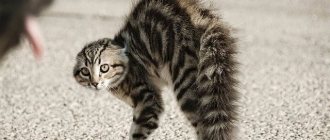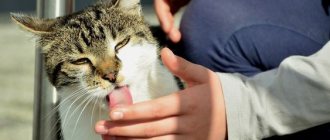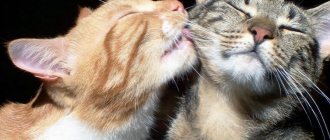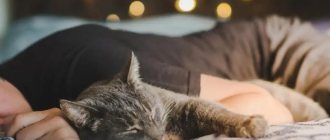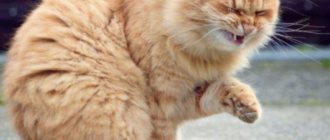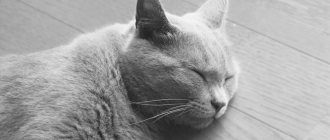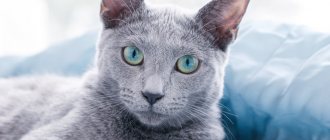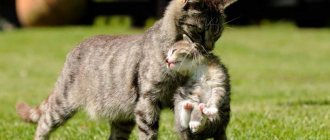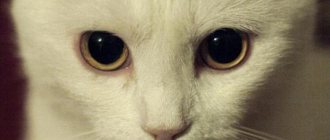| Article verified by a practicing veterinarian |
One of the features of cats for which we love them so much is the ability to make a quiet guttural bubbling sound called a purr.
They purr when they feel good, happy and comfortable; they purr as a sign of support in moments of intimacy with a person. But sometimes a cat's purring can mean stress, fear, nervousness, or even illness. Let's figure out why cats purr and wring their paws, when purring is a sign of joy, and when the owner should be wary and take the pet to a specialist.
The mechanism of purring in cats
Zoologists studying the process of purring put forward three hypotheses regarding the mechanism of rumbling:
- Cats purr using false vocal cords;
- Rumbling occurs due to air vibrations in the sinuses;
- Rumbling occurs in the lungs when air is exhaled.
The vocal cord hypothesis suggests that when a cat opens its mouth, it makes a meow, and when its mouth is closed, air vibrates in the larynx and creates a purr.
Other experts believe that when a cat experiences positive emotions, its blood pressure increases. Due to this, vibration appears in the chest and is transmitted to the sinuses, resulting in purring.
Still others believe that the rumbling is generated by the vibration of the intercostal and diaphragmatic muscles during inhalation and exhalation. Which part of the feline brain is responsible for purring is still unknown.
The most purring breeds
There is no exact data on which cats purr louder and more often than others. It depends on the character and individual characteristics of the four-legged animal. But, since purring is one of the means of communication for cats, it can be assumed that sociable cats purr more often. The most affectionate cat breeds:
- Exotic
- Burmese
- Sphinx
- Burmanskaya
- Scottish lop-eared
- Manx
- Ragdoll
- British Shorthair
- Maine Coon
- Siamese
Whether a cat will purr and caress depends not so much on the breed, but on the attitude of the owner. A kind and affectionate pet will grow up in a loving, caring family.
Reference! The British cat Merlin entered the Guinness Book of Records for the loudest purr at 67.8 dB.
Cats purr in different sounds, depending on the reasons. If you listen to your pet, you can learn to understand him much better. This will not only make the cat happier, but also strengthen the bond between the animal and its owner.
DISCLAIMER: This article does not claim to be 100% accurate and expresses solely the opinion of the author, as well as his experience of living with a cat) Enjoy reading!
Cats are quite strange creatures. Those who live with these amazing animals know this firsthand.
Cats seem to be from another universe. For no apparent reason they start rushing around the apartment, then on the contrary - they sleep all day, and they don’t care about anyone. They are harmful, capricious and cunning. That's why we love them.
But they have one feature that can seriously irritate and cause bewilderment: the cat wakes you up in the middle of the night. Why is he doing this? And no, I don’t mean the case when a pet rushes around the apartment in the middle of the night, knocking over chairs and crashing into door frames, throwing small things off the bedside table, making noise and yelling like crazy. Everything is more complicated here.
The cat simply sits down opposite you and glares at you or touches you with his paw. Agree, this is already too strange.
But don’t rush to scold your furry friend and call him a little ungrateful parasite and demonic creature) There is an explanation for the fact that the cat wakes you up at night. Now I will tell you everything.
These reasons were noted by me personally during the time when the ginger cat Simba appeared in my house.
The cat thinks you're strange
The cat is a nocturnal animal. He doesn’t understand why you, as the most important cat in the house, are so big and lazy. Sleep at night when all the fun happens! He doesn't understand that you belong to another species that sleeps at night. Well, that’s what they are, representatives of the cat family.
We just have to understand the nature of your pet and not scold him too much.
The cat misses you
Watching my cat, I concluded that another reason for this behavior is simple melancholy. I leave for work early in the morning and come late in the evening, we hardly see each other. He misses me very much. This can be seen from the way he greets me and how he then walks around with his tail all evening. And at night I wake up to Simba sitting next to my face, purring and nuzzling my neck with his little face, and sometimes lightly touching my face with his paw.
It's obvious that he's bored. I can't even be angry with him for this)
So if you wake up to your pet persistently touching you with its paw, do not scold it. He loves you very much and he misses your attention.
The cat wants to eat
Yes, this happens too. Well, he wanted to snack on food in the middle of the night, but he was somehow bored alone. So he calls you to join him. Or maybe he doesn't like how much food is left in the bowl. So, it is quite possible that your cat just needs company.
I'll tell you about my cat. My cat (why) always asks my permission to eat. So you have to tell him, “Eat, Simba, eat. I allow it.” So you think what happens if he feels the urge to eat in the middle of the night.
The cat doesn't like something about your condition
And this can happen. Cats feel much more subtly than us humans. Perhaps he sensed that something was wrong with you: your heart rate, your breathing, or maybe you were just having a nightmare.
When I felt bad, Simba would wake me up in the middle of the night. Maybe he didn't like my breathing or my heartbeat. And one day, he woke me up when I buried my nose heavily in the pillow (yes, this may sound stupid), but he was worried that I wouldn’t suffocate.
Why do you think your cat wakes you up at night? Write in the comments)
Thank you for your attention! Love cats, they deserve it!
For many, it remains a mystery why cats purr. Cute sounds, like a small running motor, warm and soothe. A phenomenon unique in the natural world still attracts the attention of scientists.
In this article we will find out not only the origin of purring, but also its purpose for the cat itself.
Photo: Why cats purr
Cat emotions and rumbling
There are many emotional states that cause a cat to purr.
The most basic ones are:
- Gratitude. A small pet purrs with pleasure from affection, a treat received, or from being close to its owner.
- Relaxation before bed. When a cat feels safe, relaxingly dozes before bed in the sun or in the arms of its owner, it purrs with pleasure.
- Dialogue between a cat and kittens. The cat, approaching the kittens, purrs, calming them down. In the wild, kittens were often left alone while their parents hunted, and thus the adults warned them that there was nothing to be afraid of.
- Self-medication and treatment. If the cat is sick or one of the pets is sick, it stabilizes the metabolism and blood circulation process due to vibrations. At these moments it is better not to touch the animal.
- Hunting interest. A cat may make purring sounds when playing or watching “game.” This is how she shows her interest.
- Fear and aggression. Many people have watched cats purr before a fight. This is how cats express their dissatisfaction and readiness to attack.
In different situations and different emotional states of the pet, the rumbling has a different tone.
When communicating with other animals, a cat may purr quietly, which indicates its trust. If a cat purrs loudly when meeting other cats, then it shows a leadership position and a readiness to attack. Sometimes purring is a request for mercy if the animal understands that it is weaker than its opponent.
The benefits of purring
There is a theory that purring can cause cats to produce a hormone that helps strengthen and grow bone tissue. Since most of the time the animal is passive, it needs restoration of the musculoskeletal system.
Cat purrs calm and relax people, helping relieve stress and lower blood pressure. The sound of purring is at a frequency of 20 to 44 Hz. It is capable of starting healing processes in humans, similar to ultrasound treatment.
One theory says that cats are able to treat gastritis, colitis and other gastrointestinal diseases in their owners with their purring.
Rumbling in communication with a person
Cat owners most often perceive purring as a sign of gratitude, but cats express a whole range of emotions with this sound. Let's figure out why cats purr.
- Cats are very sensitive to the emotional state of the owner. If the owner is tired, upset or depressed, the small pet will always try to lie down next to him or in his arms and begin to purr. It has been scientifically proven that the frequency of purring puts a person into a trance, akin to meditative practices, and he calms down.
- Often, purring is an expression of pleasure. When you pet your pet to show your love, your cat will begin to purr to show how much she likes it.
- Domestic cats are talented manipulators. When begging for a treat or affection, they may poke their heads into your hand, making a purring noise. Or rub against your legs.
- If, lying next to the owner, the cat stops purring and listens, it means that something has alerted the animal.
If your cat is constantly purring, you should pay attention to your pet's health. The animal may be sick or injured. The pet could have problems with the vocal cords, and the cat is simply not able to meow.
Owners who wonder why a cat purrs like a tractor may simply not notice that not everything is all right with the animal, and in this way it heals and calms itself.
An attentive owner will always notice oddities in the pet’s behavior.
Cat massage
There are many guesses why the pet purrs and tramples its owner with its paws. Here are some of them:
- Memories of childhood, or “milk step” - kittens knead their mother with their paws while feeding to quickly obtain milk. This brings them pleasure and is associated in adults with a feeling of comfort, satiety and security.
- Prepares a comfortable place to sleep - tramples the surface on which you are going to sleep for the greatest comfort. The owner's knees may well be suitable for this purpose.
- Gratitude - in this way one can say “thank you” for delicious food, warm shelter, tenderness and affection.
- Therapeutic massage is a common theory that this is how a cat treats its owner from ailments.
- Stress relief – by purring and moving their paws, cats lift their spirits, relax and calm down.
- Unfulfilled sexual instinct - one theory says that if an animal does not have a mate, it may show unambiguous interest.
- Marks its property - cats have glands on their paw pads that secrete a secretion. This is one of the ways to convey to other animals that a person belongs to him.
- Showing trust and love - the pet shows its owner its location, favor, openness and trust. Emphasizes your closeness with a person.
This massage soothes, relaxes and helps relieve stress. But what if claws are used? You can lightly press the cat towards you so that he lies down and stops trampling. You should not scold or drive out an animal if its trust and peace of mind are valuable. It’s better to just put a blanket or pillow on your knees in advance.
Reference! A cat will reflexively retract its claws if you stroke the top of its paws.
Rumbling as a remedy
Scientific studies have confirmed that cat owners are less likely to suffer from nervous disorders, cardiovascular diseases, arthritis, arthrosis and respiratory diseases. In families where there are cats, children have higher immunity.
- The range of frequencies that a cat makes when purring stimulates the brain's defense mechanisms and has a beneficial effect on metabolism.
- Due to the heat that the cat transmits while lying on a sore spot and under the influence of vibration, blood circulation improves. Under the influence of low frequency vibrations, increased production of endorphins begins, which significantly reduces pain.
- Doctors have long noticed this feature, which is why they often recommend that older people get a cat. The patients themselves confirm that after contact with a purring cat they feel better, and medical examinations confirm this.
British scientists have even developed a new therapeutic method - cat therapy, which is successfully used all over the world.
Cats themselves have increased stamina because they can heal themselves by purring. Their wounds and injuries heal much faster than those of other animals, which gave rise to the saying that “a cat has nine lives.”
Black cat according to the dream book
Wanting to find out why we dream about images and pictures of our own dreams, we often turn to dream books for help. A black cat in a dream is a rather ambiguous concept, which personifies, on the one hand, the dark side of human essence, and on the other, the attitude of others towards the dreamer.
Since in reality a black cat is a mystical creature, a dream in which a black cat is seen speaks of the intervention of otherworldly forces in a person’s fate. For people who have clairvoyant gifts or intuition, the meaning of seeing a black cat in a dream is a symbol that represents a solution and a way out of the current situation; this can be either a global way out of a problem or the elimination of minor troubles.
The appearance of the animal has a direct bearing on the interpretation of the dream in the dream book. Since fears, reliability, and a person’s feelings are displayed in a dream in the form of images, the meaning of what the dream is about can change its character and designation. A clean and well-groomed animal speaks of a strong and insidious enemy who is in the dreamer’s close circle.
In Miller’s dream book, a black cat is a rather unfavorable sign, but if in a dream a person managed to drive away or kill an animal, it means that all troubles will pass by, and people who have evil intentions will not achieve their goals.
A big black cat in a dream is interpreted by the dream book as the presence of ill-wishers among influential people. You should be on your guard, because difficult times will come in business, you should be patient and rationally distribute financial resources.
A dream about a black and white cat reflects a confusing, unpleasant situation, the outcome of which is uncertain in the future. To correctly interpret what a black and white cat means in a dream, you should remember what color predominated on the animal. Dark
Source
Interesting facts about rumbling
- Cats never meow when communicating with each other; they either purr or hiss;
- If you need your cat to stop purring, just turn on the water. The sound of flowing water will silence the animal.
- Kittens that do not yet have hearing purr while eating, expressing their pleasure;
- A cat's purring during sleep replaces its physical activity;
- Purring before bed helps both the cat and its owner fall asleep, as it drowns out the sounds of breathing and heartbeat.
Rumbling has many emotional connotations. Still, more often than not, pets purr with pleasure. When a cat is fed, caressed and healthy, it will gratefully please its owner with a loud purr.
Possible reasons
If a cat after intense play with long runs and rapid jumps, then there is absolutely nothing to worry about, since the animal is simply hot. There are no sweat glands on the skin of cats, and breathing through an open mouth can be a protective complex reaction of the body. Time will pass, the pet will cool its body by opening its mouth and will begin to breathe again, as befits all representatives of its species.
Stressful situation . Many meowing pets have a hard time traveling by transport, even in a comfortable car, and staying in unfamiliar, foreign places. Stress causes the animal's temperature to rise, its heart rate to increase, and it opens its mouth to cool itself.
Diagnostics
Difficulty breathing is a symptom of many diseases. Therefore, before making a diagnosis, the veterinarian will definitely clarify the details of the course of the disease: the duration and duration of the onset of symptoms, diet, the cat’s ability to access household chemicals and other toxic substances, and the presence of chronic diseases. After this, the doctor will examine the patient, assess the condition of the mucous membrane, touch the stomach, and count the pulse.
To make a final verdict, a hardware examination may be required: X-ray, ultrasound, ECG of the heart, rhinoscopic procedure. Even with a clear diagnosis, the veterinarian, as a rule, takes blood from the cat for general analysis and biochemical studies. Such actions are aimed at creating the most complete picture of the furry patient’s health status. Blood counts clearly demonstrate the stage of disease development and help identify pathogenic factors.
Veterinary consultation: Heavy breathing
Good evening! The cat is 6 years old, has been breathing heavily for about a year, and gag reflexes often appear after eating. After changing several veterinary clinics, they finally made a diagnosis - fluid in the abdominal cavity. We give injections, but they practically do not help. Dry food has been removed from the diet and he only eats liquid food. Tell me what to do in this case? Can this be cured?
Hello! The disease, unfortunately, cannot be cured. In this case, you can only make the cat’s life easier by periodically pumping out fluid from the abdominal cavity.
My sister’s kitten is breathing heavily, this has been going on for 2 weeks, she eats well and drinks water, and sometimes plays. I scratched it on my neck for fleas, a wound formed, the veterinarian came, gave me ointment to lubricate it and a tablet, said to divide it into 5 parts and give it, said that this could be due to inflammation of this wound, treated it, the wound healed, but my breathing was still heavy. What could it be.
Hello! You need to go to a veterinary clinic and have the animal examined. Heavy breathing may be due to heart problems.
Hello. I have a question: a cat that was once playful began to behave very aggressively when you pick it up. Doesn't sit, breathes quickly. I'm afraid that I got sick or that someone hit me. Please help me figure it out. And how to help your pet.
Hello! You need to go to a veterinary clinic, the doctor will examine the animal, conduct the necessary examinations and help you figure out what’s wrong with it.
Good afternoon. My kitten is one year old. He is breathing heavily, very lethargic, does not play, mostly lies down. Now he has a runny nose. I took him to the vet when he had snot and sore eyes. He took a lot of injections. They helped, but he was breathing poorly - it’s still difficult. I think maybe it’s from fear, because one red cat fought with him (more than once) and my kitten was so scared that
Source
Kitten insults older cat
We adopted a kitten less than a week ago; we already have a 6-year-old cat named Vaska (noble breed). His character is peculiar, he allows himself to be petted only when he wants, he doesn’t particularly like to sit in his arms, he is vindictive, sometimes he becomes quite affectionate when the mood strikes him, neutered, obedient (goes to the potty regularly, doesn’t climb on tables, knows the “no” command). The kitten's name is Petka, he is about 4 months old, also a nobleman. Like all kittens, he is very active, affectionate, loves hands, purrs, and is easy to train (in just 2-3 days they weaned him from climbing on the table and practically weaned him from biting arms and legs, from attacking a child, weaned him off using a spray bottle for flowers). When we adopted the kitten, we thought that the older cat would behave aggressively towards the kitten, but our situation is the opposite. The elder Vasya is afraid of the kitten. Petya tries to play with him and does not allow him passage, constantly attacks him. Sometimes they fight with their paws. Vasya, for example, sits on the table, and Petya is on the floor, and they beat each other, but without aggression, they don’t hiss, they don’t rumble. Only the eldest is alarmed at this moment, and when the kitten overtakes him, the eldest presses his paws to the floor and runs away, climbs onto the wall and sits there almost all day (his fortress there is the highest point in the house). We introduced them carefully, at first they sat in different rooms, then they let the little one out, for the first two days they didn’t approach each other at all, Vasya didn’t eat or drink anything at all, he even went to the toilet every other day. I constantly petted them, talked to them, fed them together (I brought my favorite treats straight into the room). On the third day they sniffed each other and tried to play as I described above. It's day 6 now. You have to feed separately, because... Petya don't let me
Source
the cat is breathing heavily
a couple of weeks ago the cat sat all night by the open window and apparently caught a cold... he began to breathe heavily, sneeze, cough, stopped eating and writing... they took him to the doctor... they said pulmonary edema... they prescribed a course of injections... by the evening the cat it got better...started eating and going to the toilet. After a week, the cough disappeared and the cat completely recovered, behaved as usual and was breathing well. Another week has passed and he is breathing heavily again, but at the same time he bites well and also goes to the toilet well, plays, purrs... what could it be? After all, the kitty is in a good mood and eats. What other reasons could there be for heavy breathing?
You did not write what medications were prescribed. Did you have a control x-ray of your lungs done after treatment? Of course, domestic animals and yard animals differ sharply in their immunity. But often the cause of pulmonary diseases is a more serious enemy than just a cold caught near an open window. For cats, this is rather a rarity for some reason. It is also the most difficult to overcome with an antibiotic that does not attack the pathogen. This is why it often happens that you treat while you inject normally, as soon as you finish, then hello again.
Please write what you treated with and in what dosages. It would be correct to monitor the cat’s condition, at least a general blood test and a control x-ray of the lungs. The reason may be that the cat was not fully treated and the disease begins to progress again. The sooner we establish the cause, the easier it will be to cure the cat.
what I want to say about the picture... they didn’t actually take a picture for us... they just listened to us with a phonendoscope and said that there was fluid in the lungs, they said that there were 2 options: either a heart or a cold, but they say because of the fluid you can’t hear the heart and first you need to give these injections to remove the fluid, and if it’s a cold, then after a course of injections the cat will feel better, and if it’s a heart condition, then you’ll have to go to another clinic to take a picture, since ours doesn’t have any services... in the end, after
Source
These tablets were bought for a kitten from the street, apparently more than 2 months old. The kitten's belly was very swollen, it was clear that it was necessary to poison the parasites.
The kitten swallowed the pill at about 14:00, and at 20:00 a ball of threads came out (sorry for the details), quite huge for a kitten of its age. From the same day, side effects began - the cat categorically refused to eat, drank little, within a day his fur was strange and dirty, he had to be bathed again. His appetite did not appear for three days (the cat did not eat anything at all, he spat out food), at the same time, the cat continued to play, run, and have fun. My stomach immediately subsided and became soft. Gradually, the cat’s health returned to normal, he grew quite well in a month, his appetite is good, he goes to the toilet often.
I don’t know what’s right and what’s wrong, in our city veterinarians are indifferent to animals, they didn’t advise me anything special and usually refuse to treat kittens. I believe that the pills dealt with the problem, and the side effects were due to the fact that the kitten’s body was weakened, which means living on the street, with worms, fleas and ticks, constantly eating whatever was available. As I understand it, the pills hit the liver.
We recommend reading: How Much Food Should You Give Your Cat?
INDICATIONS FOR USE Dirofen tablets are prescribed to adult cats and dogs, kittens and puppies from 3 weeks of age for prophylactic and therapeutic purposes for nematodes (toxocariasis, toxascariasis, uncinariasis, trichucephalosis, hookworm infection), cestodiasis (taeniosis, dipylidiasis, echinococcosis, diphyllobothriasis, mesocestoidosis) and mixed nematodo-cestodal infestations. CONTRAINDICATIONS A contraindication to the use of the drug is individual intolerance to the components of the drug (including a history of it). Dirofen tablets should not be used by females in the first half of pregnancy, puppies and kittens under 3 weeks of age, exhausted animals, patients with infectious diseases and convalescent animals.
Source
You have JavaScript disabled. Some functions may not work. Please enable JavaScript to access all features.

